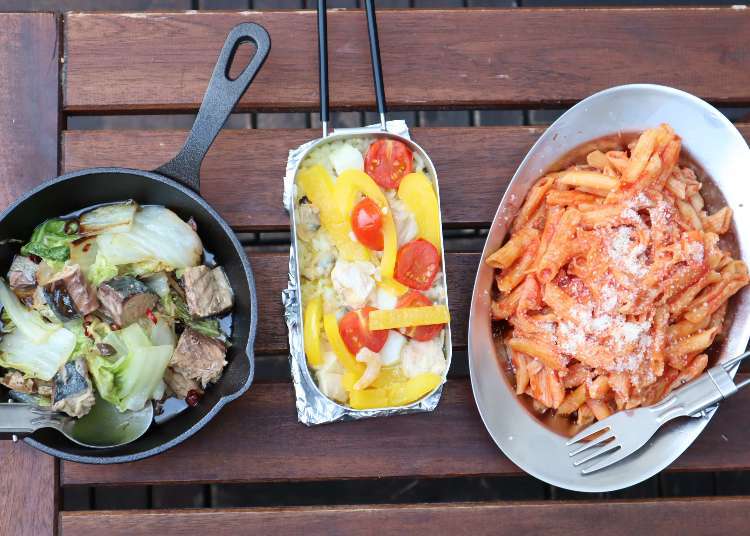
3 Mouthwatering Outdoor Recipes Made With 100 Yen Shop Items!
- Written by: Miyu Shimada
Owing to the spread of COVID-19 making indoor life difficult, outdoor cooking has recently seen a rapid spike in popularity! However, for those without camping gear and know-how, getting away from it all in nature can be troublesome.
However, you don’t have to camp to enjoy an outdoor lifestyle - fun and easy outdoor cooking using specialized tools and recipes allows the thrill of camping without setting up the tent! Even if you can’t get away from home, cooking on your veranda (in what could be called 'Veramping') is more than enough to feel the freshness and freedom of being outdoors.
Making it even easier are Japan’s ubiquitous and internationally-beloved 100 yen shops! Stocking an impressive range of outdoor gear for discount prices, these are the places to go for outdoor cooking on a budget!
In this article, our English editor, Timothy, will challenge himself to create the ultimate outdoor cookout using items procured only from a 100 yen shop (excluding some ingredients)!
Using easy-to-make recipes currently trending on social media, Timothy will make and taste his creations to bring our readers the full report!
Today’s Outdoor Cook: American Expat Timothy!
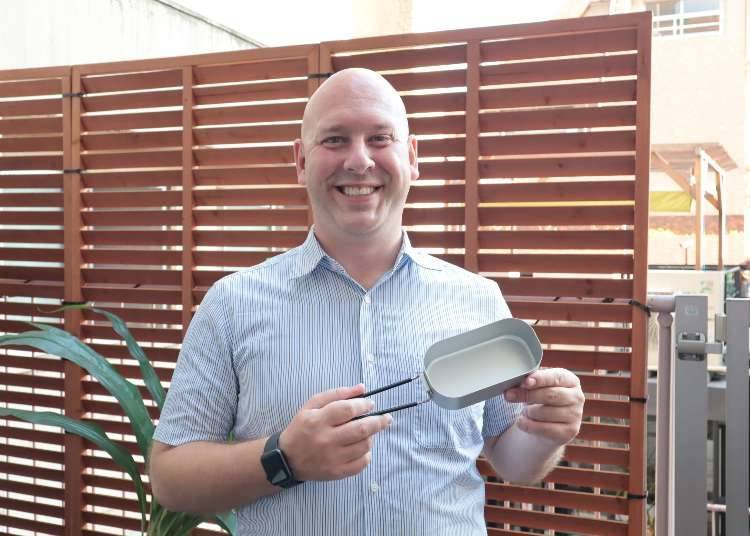
Thrifty but without scrimping on quality, Japanese 100 yen shops are all the rage with international travelers and expats living in Japan. With this in mind, we asked American expat Timothy to be our cook and taste-tester for this project.
“I do enjoy going camping now and then. This time, I will try making the ultimate outdoor meal using only 100 yen shop items! I’m excited to see if I can actually pull it off!” said Timothy.
Introducing Our 100 Yen Shop Outdoor Items!
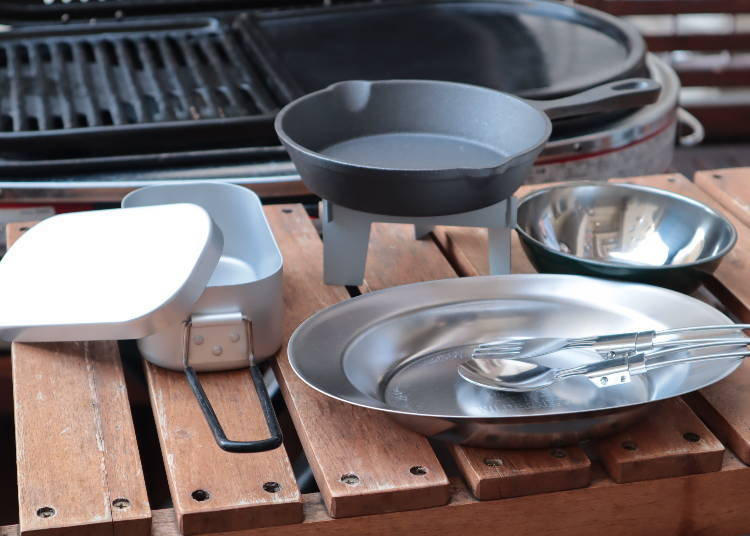
Even within pro-camping groups, the outdoor and camping goods available at many of Japan’s 100 yen shops have a stellar reputation. Prices generally range between 100 - 1,000 yen, which is remarkably cheaper than specialist camping stores with little to no reduction in functionality.
For those who simply want to camp and cook casually, they are more than satisfactory! There are also plenty of original items available, not sold anywhere else!
For this article, we settled on the following:
・DAISO: Aluminum Camping Pot - With Handle (550 yen)
・DAISO: Skillet M (330 yen)
・DAISO: Alcohol Burner Tripod (110 yen)
・Seria: Stainless Steel Plate (110 yen)
・DAISO: Foldable Fork/ Foldable Spoon (both 110 yen)
・Can Do: Foldable Aluminum Windshield (330 yen)
We visited four 100 yen shops: Can Do, Seria, DAISO, and Lawson Store 100 (ingredients). Each brand has its own unique specialty, with Seria boasting stylish, designer items, DAISO stocking loads of useful camping essentials like pots and skillets, Can Do having an amazing, high-quality range of smaller trinkets and accessories, and Lawson Store 100 stocking most of the food and ingredients you’ll need.
While each 100 yen shop has a dedicated outdoor section, the lineup can differ significantly between individual stores. Inventory status also changes virtually every day, so if you spot something you need, don’t wait around!
The portions of the following recipes have all been adjusted to fit the containers and equipment. Enjoying it together with other food, they can serve roughly 1.5 - 2 people.
Canned Mackerel Al Ajillo: Entice Your Appetite with Garlic!
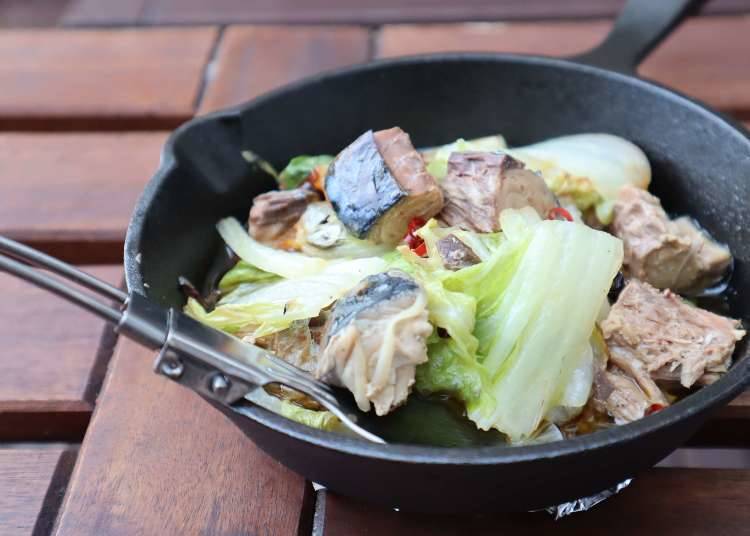
Since many years ago, canned mackerel has steadily grown to become more and more popular in Japan. Being discovered as a great food for dieting along with the increased demand for preserved foods in the face of COVID-19, canned mackerel is now a common staple in home pantries across Japan.
One of the best dishes to make with canned mackerel is al ajillo, or “ahijo,” as it is pronounced in Japan. This traditional Spanish condiment has become a massive hit in Japan due to its garlicky flavor and exotic appearance.
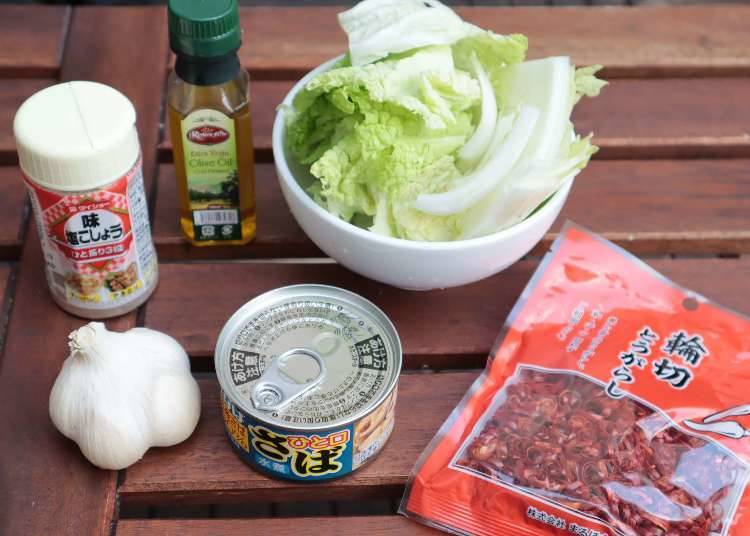
Ingredients: (Those marked ★ can be purchased at a 100 Yen Shop)
・★Canned mackerel in brine...1 can
・Chinese cabbage...¼ of a small-sized cabbage, ⅛ of a large one
・Garlic...2 cloves
・★Olive Oil...2 tablespoons
・★Salt/pepper...just a little
・★Round-sliced chili pepper...just a little
Recipe:
1. Spread olive oil on the skillet and throw in the sliced garlic and chili pepper.
2. Slice the Chinese cabbage into easy-to-eat portions and add it to the skillet. Put the lid on (you can use another skillet of the same size or aluminum foil instead). Once the volume has reduced by half, garnish with salt and pepper.
3. Add canned mackerel and give it a good stir before serving.
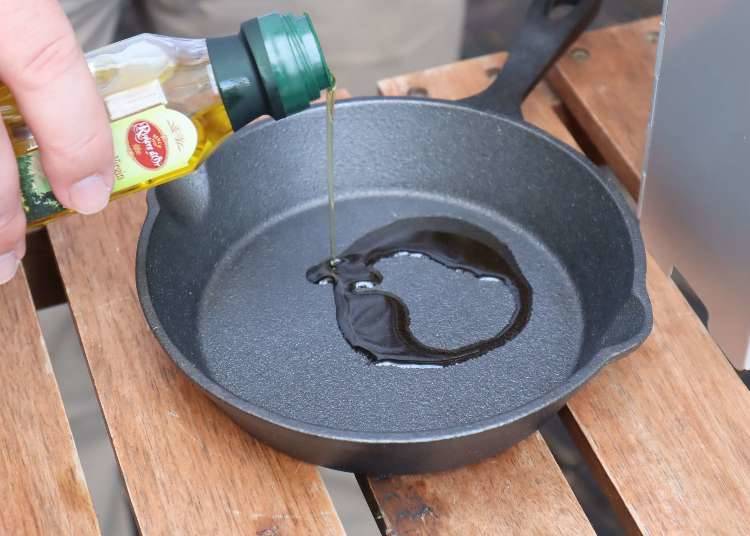
A Super-Easy Canned Mackerel Al Ajillo Recipe:
First, drizzle down some olive oil.
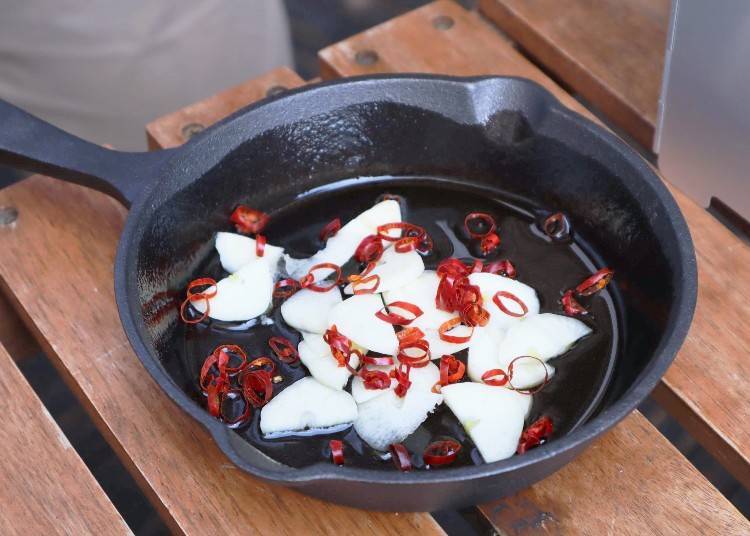
Then, add the sliced garlic and chili peppers.
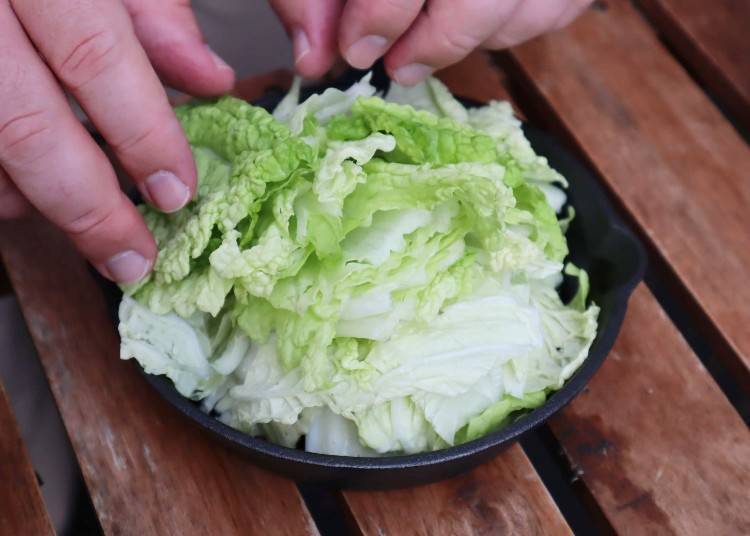
Next, cover the entire skillet in sliced Chinese cabbage.

Wrap the skillet from the top firmly, like it’s an actual lid. For this article, we used aluminum foil. However, if you have another pan of the same size, you can cover it using that instead. This will act as both a weight while preventing moisture from escaping.
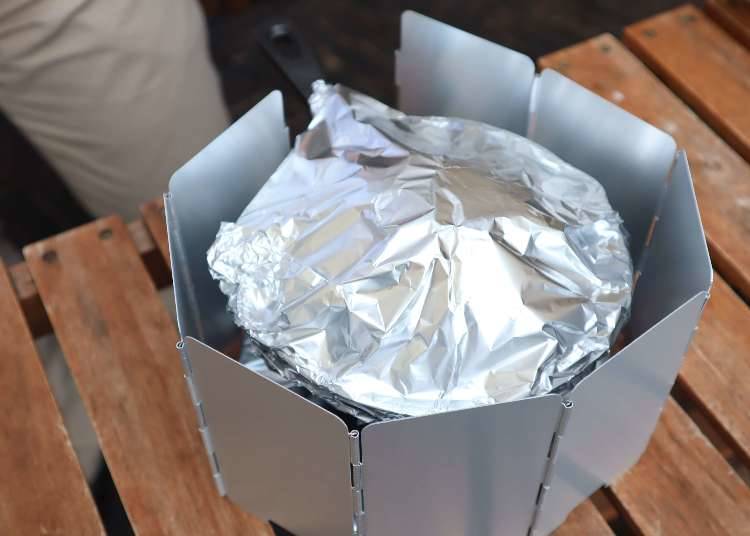
After this, turn on the heat! While keeping a close eye on it, keep the flame on until the cabbage is soft and supple and has lost roughly half its volume.

Once the dish is twice as small and appears soft and bouncy, sprinkle on some salt and pepper to taste.
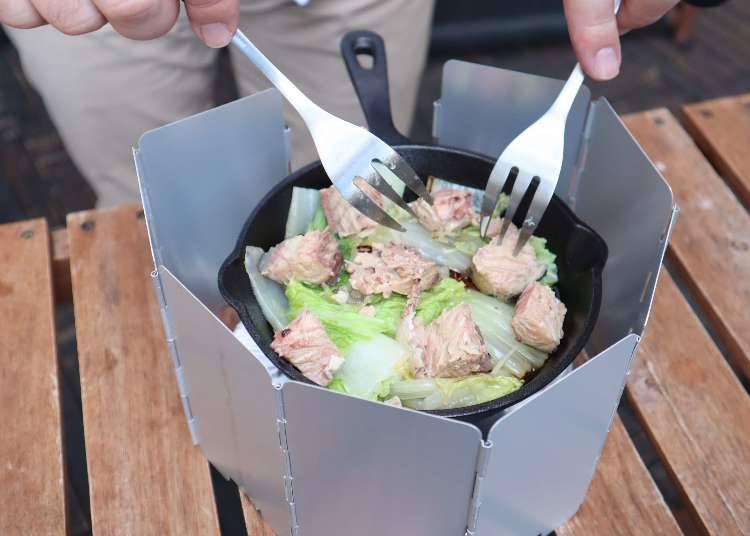
Add the canned mackerel.
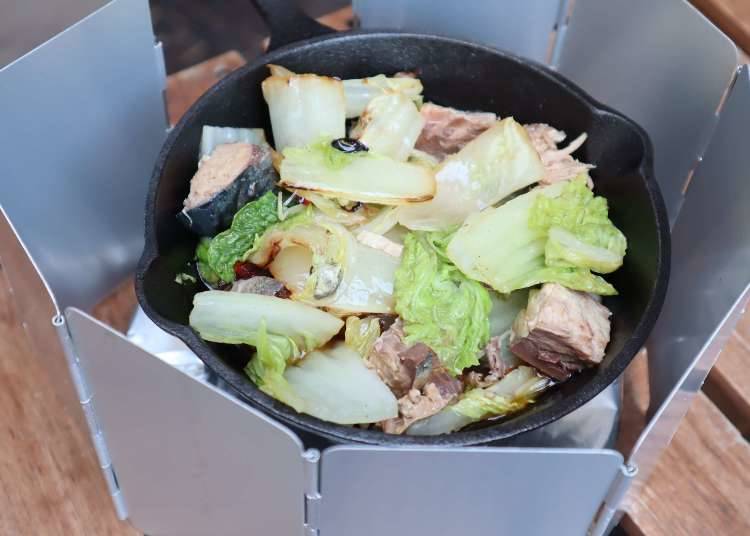
After giving everything a thorough stirring, you’re done!

Without skipping a beat, Timothy got stuck in. “It’s the perfect al ajillo! The intense bursts of the garlic are super appetizing, while the cabbage absorbs the umami flavors to make everything twice as tasty!” said Timothy in between mouthfuls.

From the enticing aromas alone, we could immediately tell the dish was a success. While regular ahijo dishes see mushrooms, shrimp, and more cooked in a teppan, Chinese cabbage and canned mackerel make for a surprisingly good substitute!
Even during real camping trips, as long as you have canned goods and leftover leafy vegetables available, you can easily cook up this dish. It’s also the perfect accompaniment to sake, beer, and other beverages!
This dish was inspired by the “Canned Mackerel Ahijo” recipe from Instagrammer “Veranda Meshi” (@veranda_meshi). Boasting over 57,000 followers, Veranda Meshi specializes in making and posting camping foods and cooking.
Cheese, Tuna, and Tomato Penne: Throw Everything Together and Wait!
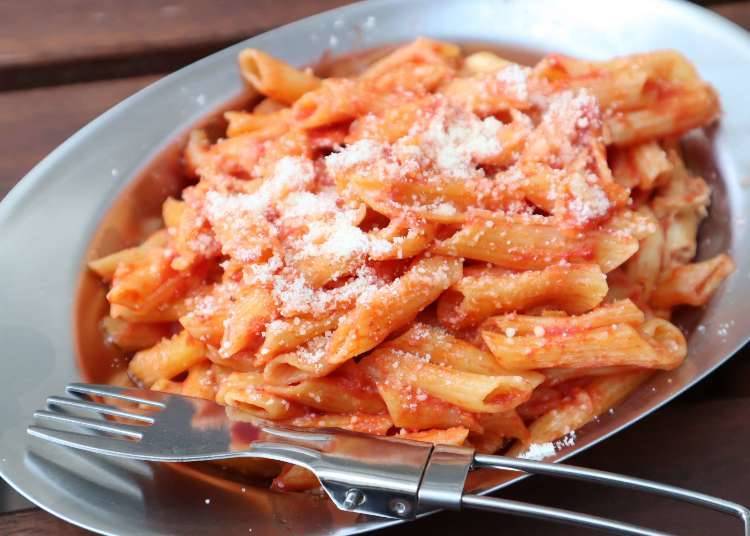
YouTube and various online blogs are chock full of exciting new ways to create delicious outdoor penne delicacies! Despite using everyday tomato juice and being easy to cook, the following recipe boasts a surprisingly authentic taste backed up by an extremely high reputation.
As tomato juice in paper cartons can be stored at room temperature, you won’t need to bother with ice packs or refrigeration. It’s also a great recipe to remember during times of emergency.
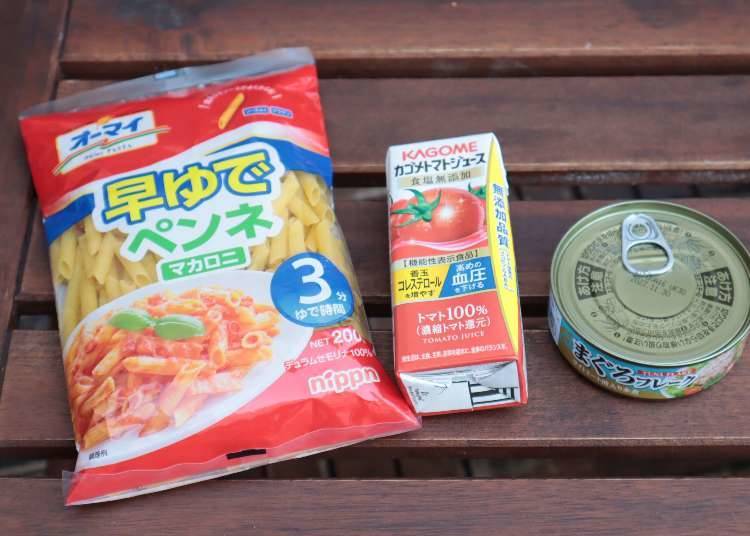
Ingredients: (Those marked ★ can be purchased at a 100 Yen Shop)
・★Quick Cook Penne...100g
・★Tomato Juice...200cc
・★Canned Tuna...1 can
・★Olive Oil....a dash
・6P Cheese...1 piece, or a suitable amount of powdered cheese
・Consommé...as required
・Pepper...as required
・Salt...to taste
Recipe:
1. Combine penne with tomato juice (200ml) along with a little consommé and a touch of olive oil.
2. Add canned tuna and cheese.
3. Turn on the heat. Once the fuel has expired and the flame dies, the dish is done. Sprinkle on some pepper for the final touch.
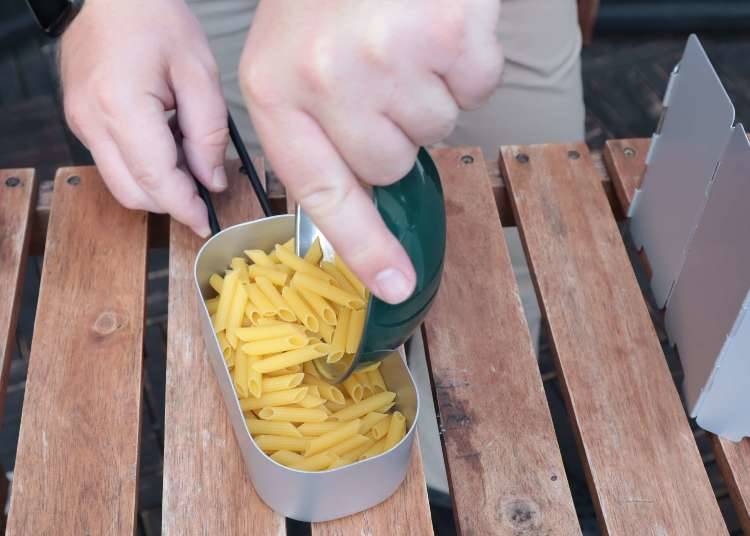
A Super-Easy Cheese, Tuna, and Tomato Penne Recipe:
Place the penne in the camping pot.

Pour in an entire pack of tomato juice.
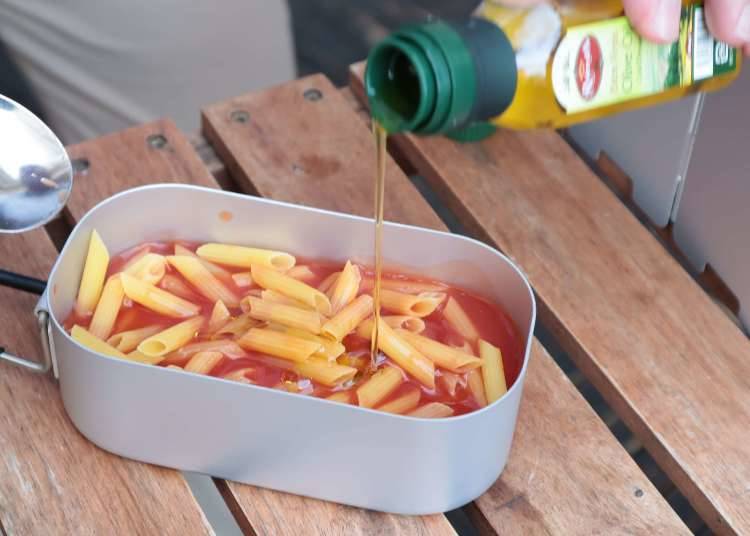
To prevent the penne from sticking, add olive oil as required and mix it all together.
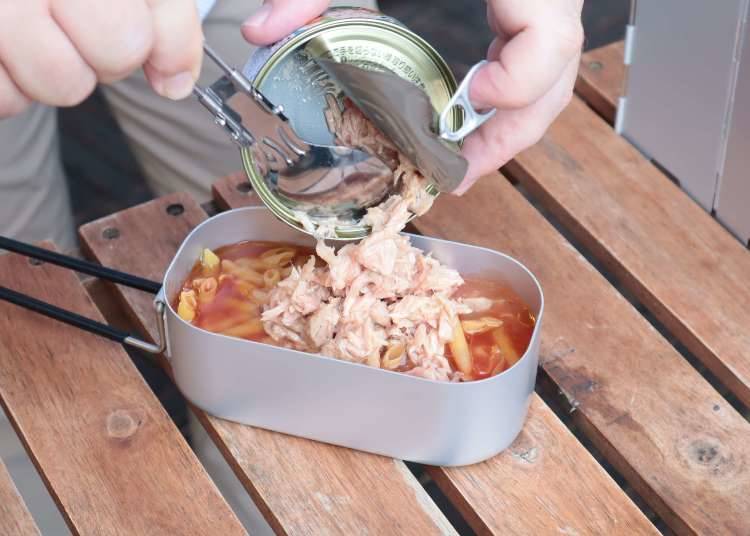
Add the tuna and a dash of consommé and give it another mix.
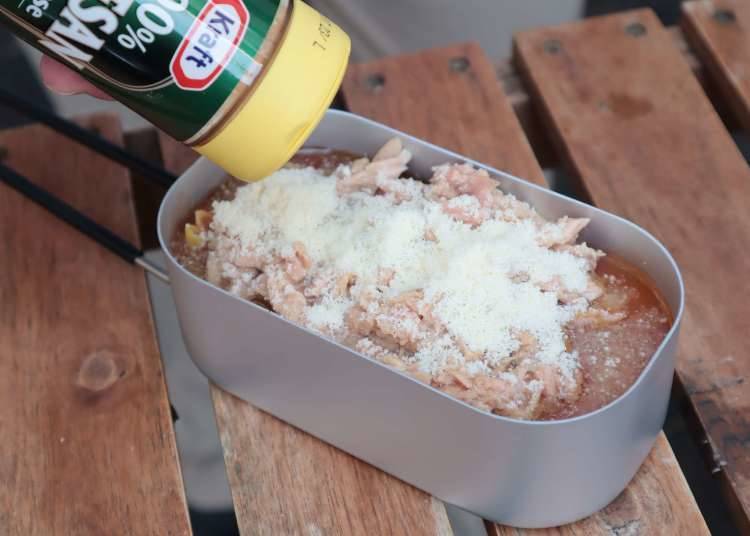
This time we simply used powdered cheese; however, you can also use cheese slices or another cheese of your choice.

Close the lid and turn on the flame. Now we play the waiting game...
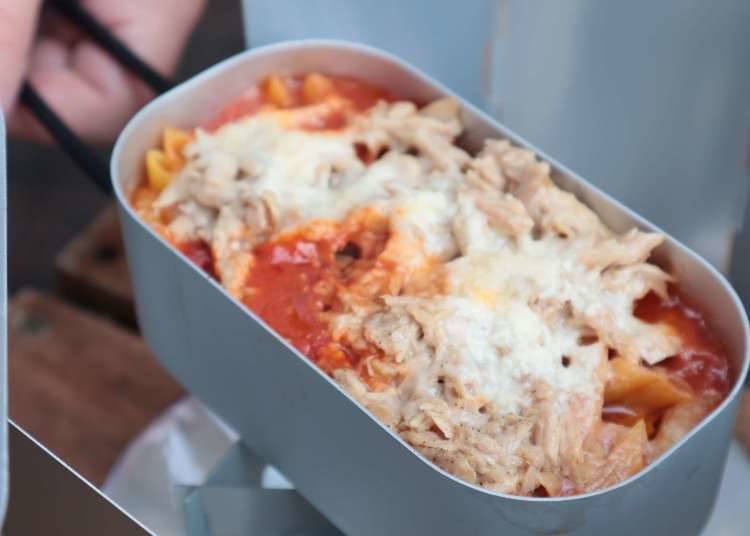
Once the flame goes out by itself, you’re done! Too easy, right?
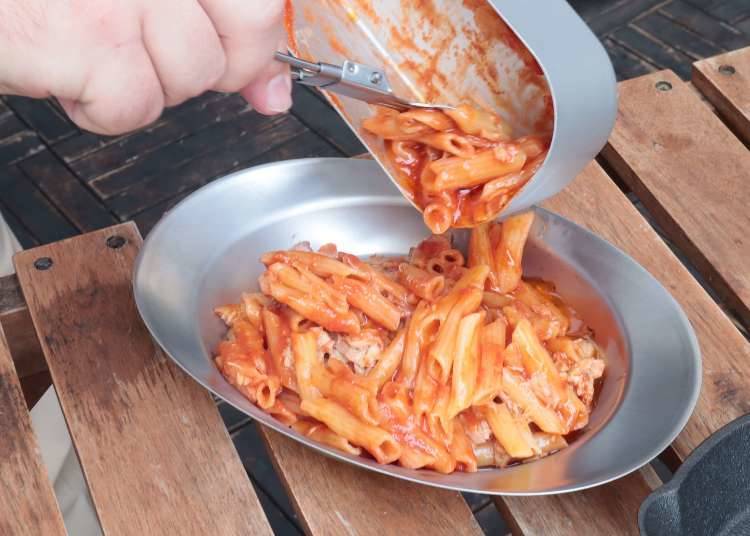
For a little extra flair, we arranged our pasta on a stylish stainless steel plate.

As you can see from his facial expression, Timothy was utterly delighted! “The penne is properly cooked al dente style - perfectly firm and chewy! The tomato adds a certain satisfying richness...it’s simple and super tasty!”
While saving the time and trouble of boiling water, this quick and easy outdoor meal yields a hearty tomato flavor along with a deep umami taste brought out by the tuna.
You can adjust the flavor by changing the type and amount of cheese, allowing one to make a highly personalized dish to suit all palates. We never expected Italian cuisine to be this good outdoors!
Seafood Paella: Authentic Outdoor Rice With Huge Instagram Potential
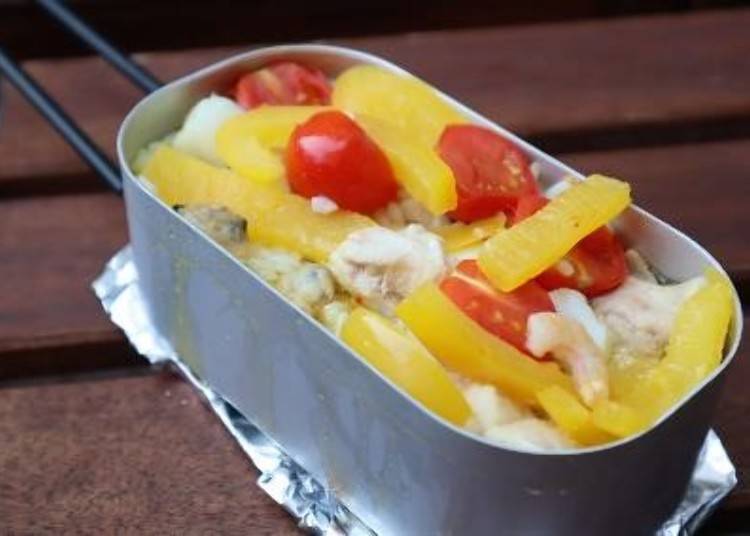
The final recipe we’d like to introduce is a seafood paella. This little number has become a sensation on Japanese social media, with its eye-catching, colorful arrangement looking great in photos!
While cooking with rice may seem too big of a challenge for outdoor cooking, the seemingly boundless versatility of our humble camping pot makes it a walk in the park. In fact, even single people these days just eating a bit of rice are starting to use camping pots instead of regular pots and rice cookers at home!
A Super-Easy Recipe For Seafood Paella:
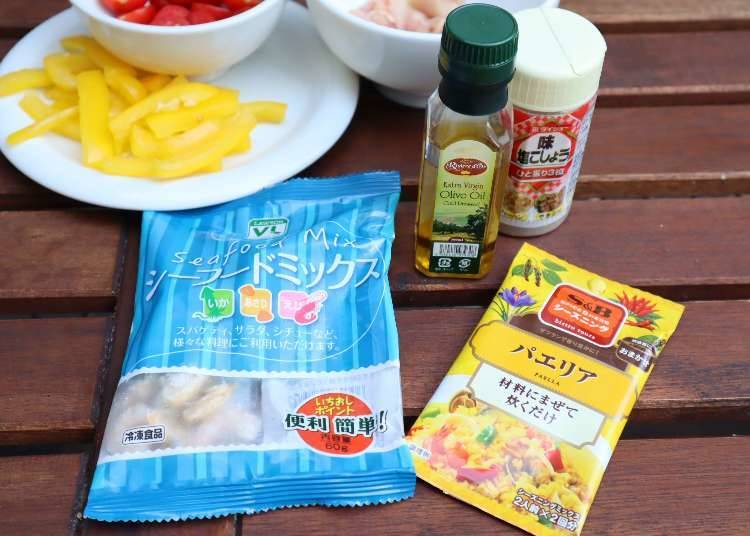
Ingredients: (Those marked ★ can be purchased at a 100 Yen Shop)
・Rice...one cup
・Water...180cc
・Chicken...50-80g
・Cherry Tomatoes...Around 5
・★Bell Pepper (yellow)...¼
・★S&B SPICE & HERB Seasoning: Paella...one packet
・★Frozen Seafood Mix...one packet
・★Olive Oil...a little
Recipe:
1. Wash the rice and place it in the camping pot while letting it soak in water (at least 20mins)
2. Mix in olive oil and seasoning
3. Add the frozen seafood mix, tomato, bell pepper, and chicken
4. Turn on the heat. Once the flame naturally dies, wrap the entire camping pot in a towel and allow it to steam for 10-20mins.

Once the rice has thoroughly soaked in the camping pot, add olive oil and seasoning. As a general rule, when cooking rice in a camping pot, you’ll need to add roughly 200cc of water for every cup of rice. However, the moisture from the frozen seafood will add additional water later, so it’s best to start with a little less.

Add the seafood mix and stir it all together. This type is a little smaller than a regular bag of seafood mix; however, it should be enough to satisfy most!

Put in the chicken.

After placing tomato and bell peppers on top, preparation is finished!
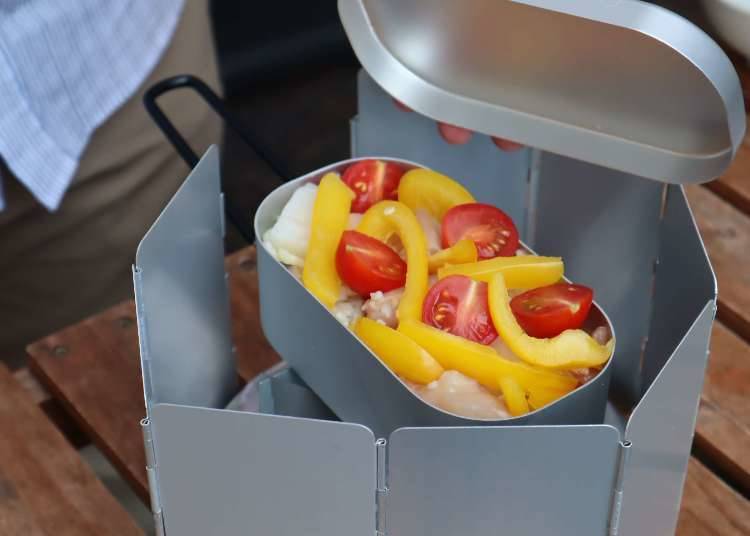
Secure the lid and let it cook. Once the solid fuel has burned out, wrap the pot in a towel and let it steam for 10-20mins.
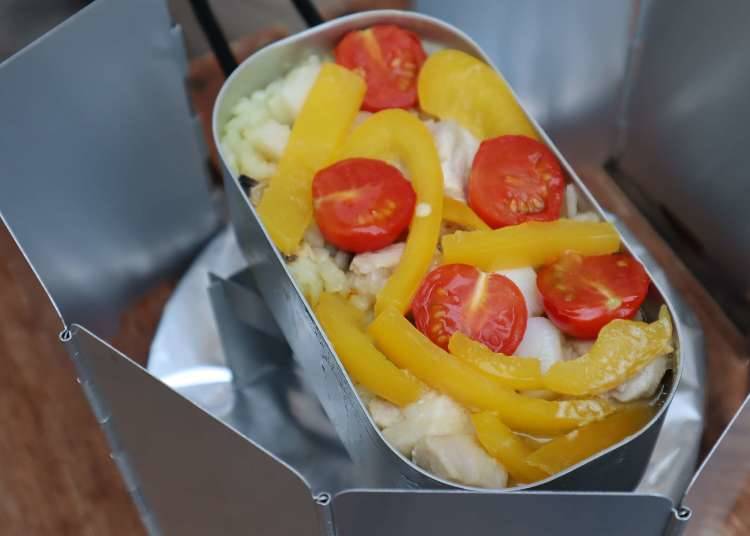
This is the final product! Once you lift off the lid to reveal your work, you’ll be instantly hit with the nourishing smell of authentic outdoor paella! If you’ve done everything correctly, both the chicken and seafood will be perfectly cooked through!

Unable to restrain himself, Timothy jumps in for a bite!
“All the flavors have thoroughly soaked into the rice! It's so easy, just to mix everything together in a camping pot, cooking it, and, voilà, having such a tasty result! It’s almost too easy!”
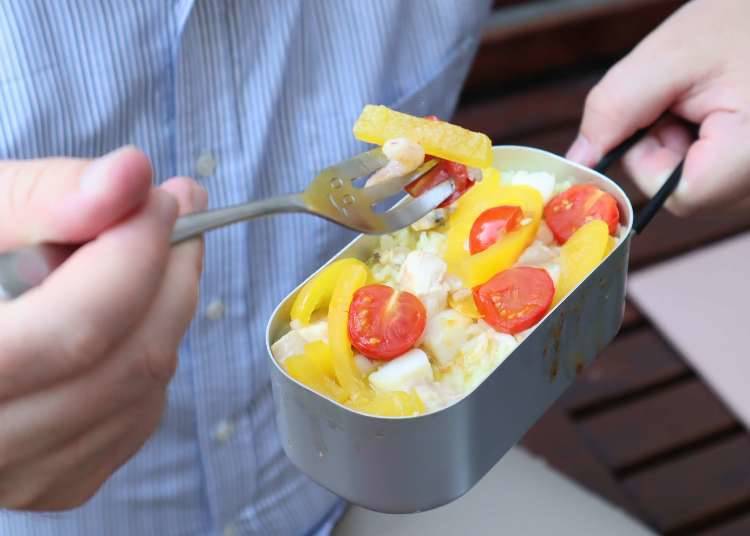
With squid, clam, and shrimp, it’s a surprisingly bulky meal considering the easy preparation! The whole cup of rice means that even those with large appetites will surely be satisfied, and the use of pre-packaged seasoning ensures that no mistakes can be made.
Above all, the dish is colorful and pretty, complementing the surrounding greenery and making your time outdoors all the more spectacular.
This dish was based on a recipe by Komorebi no Naka (@swimmy_1234), an Instagrammer who posts pictures of stunning and informative camp scenery, equipment, and cooking.
The Verdict: Outdoor Cooking Using 100 Yen Shop Items was an Indisputable Success!
Most of the items pictured and used in this article were assembled from various 100 yen shops across Japan. Upon testing out the items with camping recipes, we discovered them to be easy to use and able to create outdoor meals with authentic indoor quality.
While actually cooking while camping can be a strenuous feat, these items can be easily collected from your local 100 yen shops, allowing anyone to experience a real outdoor lifestyle with ease.
Such fantastically designed and affordable items are a rarity overseas, so don’t miss the opportunity to pick some up while in Japan! With the rainy season winding down and summertime on the way, the time to finally relish food outside in Japan is fast approaching.
Get a head start on your summer planning by assembling your very own Japanese 100 yen shop camping collection to make the most of Japan’s great outdoors!
*The items and prices introduced in this article are current as of June 2021. For the latest information, always check the official site or store.
Miyu is a travel writer and tour conductor with over a decade of experience in developing educational content for working individuals. She has a passion for exploring new cultures and has visited more than 150 cities in around 50 countries. Her goal is to sample great food, experience nature, enjoy historical sites, and bathe in hot springs around the world. Miyu left her corporate job to pursue her passion for travel and now spends over 100 days a year abroad while working as a writer. She promotes the joy of travel, the beauty of Japan, and the diverse cultures of the world by traveling to different parts of Japan and collaborating with inbound tour operators and fellow travel writers.
- Area
*Prices and options mentioned are subject to change.
*Unless stated otherwise, all prices include tax.
Popular Tours & Activitiess
Recommended places for you
-
Ad

Discover the "Miraculous Forest" in the Heart of Tokyo: The Institute for Nature Study (9 Minutes from JR Meguro Station)
-

Japan’s Shinkansen Is About to Change Travel in an Unexpected Way
by: Guest Contributor
-
Ad

Complete Guide to Ueno's National Museum of Nature and Science, the Perfect Place to Visit on Rainy Days or With Children
-

This Winter, Godzilla Takes Over Haneda Airport
by: Guest Contributor
-

New in Ginza! Air BicCamera Ginza Opens with a Faster, More Convenient Shopping Experience
by: Guest Contributor
-

Strawberries, Style, and Tokyo’s Coolest Neighborhood: Winter Afternoon Tea in Kichijoji
by: Guest Contributor
Inspiration for Accommodations
-

Enjoy Mt. Fuji from the Comfort of Your Room! Recommended Ryokan with Mt. Fuji View
-

Stay Near the Cherry Blossoms! Hotels for Cherry Blossom Viewing in Tokyo
-

Family-Friendly Hotels with Free Shuttle to Disneyland: Convenient Access for a Magical Stay
-

Top Ranked Hakone Hotels with Mt. Fuji View: Enjoy Stunning Scenery from Your Private Space
-

Convenient Tokyo Hotels with Airport Shuttle: Ideal for Families and Heavy Luggage
-

Stunning Tokyo Tower View Hotels: Enjoy Spectacular Scenery from Your Private Space
-

Convenient Asakusa Hotels with Kitchens: Ideal for Extended Family Visits
-

Experience Luxury: Hakone's 10 Best Five-Star Accommodations
-

Enjoy Mt. Fuji Autumn Leaves! Top Hotels Near the Popular Autumn Leaves Corridor
-

Experience Hakone Fall Foliage from Your Room with Stunning Views
-

Tokyo Tsukiji|Tsukiji Area Map & Sightseeing Information
-

The Recipe for Ichiran Ramen's Global Success
-

What to Pack for Japan: 8 Essential Things for a Hassle-Free Trip
-

16 Secrets About Mt. Fuji, the Symbol of Japan: Even Japanese People Don’t Know That?!
-

JR Edition: Visit all of Tokyo in one Day with the Tokyo Metropolitan District Pass!
-

Golf, Beef & More: How Donald Trump Does Tokyo in 72 Hours!
- #best ramen tokyo
- #what to buy in ameyoko
- #what to bring to japan
- #new years in tokyo
- #best izakaya shinjuku
- #things to do tokyo
- #japanese nail trends
- #what to do in odaiba
- #onsen tattoo friendly tokyo
- #daiso
- #best sushi ginza
- #japanese convenience store snacks
- #best yakiniku shibuya
- #japanese fashion culture
- #best japanese soft drinks



















